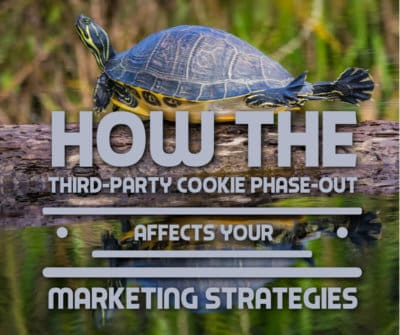 Cookies may sound like delicious tidbits of information, and for the electronic universe, they certainly are. Unbeknownst to many consumers of the Internet, every visit to a website likely results in baking a dozen or more of these “cookies.” Recently, much attention has been placed on how browser companies are disclosing, collecting, storing, and sharing information about their users, leading to a third-party cookie phase-out. But exactly what are cookies, what are they used for, and what changes are in process that could change marketing strategies for small companies?
Cookies may sound like delicious tidbits of information, and for the electronic universe, they certainly are. Unbeknownst to many consumers of the Internet, every visit to a website likely results in baking a dozen or more of these “cookies.” Recently, much attention has been placed on how browser companies are disclosing, collecting, storing, and sharing information about their users, leading to a third-party cookie phase-out. But exactly what are cookies, what are they used for, and what changes are in process that could change marketing strategies for small companies?
What are cookies?
Cookies are coded bits of information that act like a trail of crumbs to show where a user has traveled on the Internet. Cookies are used for a variety of purposes—some for the benefit of the user, some for the benefit of advertisers, and some for both. There are predominantly two types of cookies:
- First-party cookies are stored on the website a user is visiting. Sometimes these are used to “save” the items in a shopping cart or to remember which items were “liked” as favorites by the user in a previous visit. First-party cookies provide convenience for the user that the domain owner hopes will translate into repeat visits or online purchases.
- Third-party cookies are bits of information about a user’s site visits stored on a different domain. There are a number of uses for third-party cookies including analyzing website visits and user actions, allowing third-party companies to provide supplementary services like chatbots, linking to social media, and cross-site retargeting. The most talked-about function of third-party cookies, however, is using the stored information to create personalized ad targeting.
The way third-party cookies work can sound complicated, but a simple illustration creates clarity. Imagine if you spent the day visiting stores throughout the mall. The mall’s security cams would have recorded you walking around the mall, and someone could compile a list of each store you visited. If that list showed you were mainly visiting children’s clothing stores, a call could be made and a mall representative would run out to hand you a coupon to entice you to visit a furniture store with a sale on youth furniture. The same thing happens online. When you use Google’s Chrome browser, each site you visit is stored in the browser software. Google uses that information to send you what they feel are relevant advertisements (i.e., Google Ads.)
What changes is Google making with the third-party cookie phase-out?
Google announced in August 2019 they would phase-out the use of third-party cookies within two years. Apple’s Safari and Mozilla’s Firefox browsers already block third party cookies automatically. Google has been the last to make this change likely because 90% of their revenue comes from their advertising functions—and with a 67% slice of the browser market share pie, it will represent a significant change for businesses marketing online.
What does the third-party cookie phase-out mean for businesses?
If your company is relying on Google Ads or AdSense, you should talk with your marketing agency now to begin to pivot your marketing strategy. With third-party cookies on the way out, Google will likely be placing advertising of a company on what they feel a relevant website will be. To understand what this means, think about the ads inside your favorite magazine. They purchased space there because they felt if you were reading that particular magazine it was likely you would be interested in their product.
The larger implication for small businesses, however, maybe in the methods used to analyze site usage. Google has provided assurances they will have an alternative available, currently called the “Privacy SandBox” where user-generated data will be stored and available in a more limited format to technology companies for analysis. In other words, there will still be information about the number of visits and clicks, but there will be no ability to identify who those visitors were specifically.
To ensure your website continues to bring you success no matter what changes occur in the technology environment, choose Paradux Media Group as your marketing partner. We have the professional expertise to make sure you achieve an optimal presence online and in-person. Give us a call today to learn how easy it is to get started!
- Published: January 11, 2021
- Author: Angela Peacor
- Blog: Marketing Intelligence Report
- Category:
- Tags:
- Comments:
Quacktastic Reviews:
Excellent team to work with! Mike and Tisha are fantastic at coming up with new ideas while staying true to my companies vision, values, and…

Operating a restaurant and bar is hard enough. It demands wearing many hats. Promotions and marketing is not one of them any longer since we…











Can not recommend this team enough. What started as a one-time website re-design has evolved into Paradux handling the vast majority of our marketing. Business…











We would not be able to run as smoothing, quickly, or efficiently if it was not for Paradux Media Group. Tisha and team is hands…











Recently, I had the opportunity to work with Paradux Media on a website build, and I just couldn’t have been happier with the process and…











Mike and his team are well known within the region and marketing community as an insightful industry leader. If you are looking for a Marketing…











Paradux Media is a very professional group, and they know what they’re doing. Whether they are placing buys for clients, or producing high-quality TV spots,…











Paradux helped build my business in all capacities. Without them, I would never have had the resources and ability to get so much accomplished –…











Mike, Tisha, and the team can build you anything you want for your company or small business. Very knowledgeable and easy to work with. They…











As a long-time client of Paradux, I can confidently say that their creative team is one of the best in the business. They consistently produce…





















